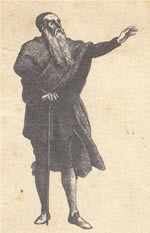 Relevant History welcomes back Anna Belfrage, who, had she been allowed to choose, would have become a time-traveller. As this was impossible, she became a financial professional with two absorbing interests: history and writing. Anna has authored the acclaimed time travelling series “The Graham Saga,” set in 17th century Scotland and Maryland, as well as the equally acclaimed medieval series, “The King’s Greatest Enemy,” set in 14th century England. To learn more about her and her books, visit her web site and blog, and follow her on Facebook and Twitter.
Relevant History welcomes back Anna Belfrage, who, had she been allowed to choose, would have become a time-traveller. As this was impossible, she became a financial professional with two absorbing interests: history and writing. Anna has authored the acclaimed time travelling series “The Graham Saga,” set in 17th century Scotland and Maryland, as well as the equally acclaimed medieval series, “The King’s Greatest Enemy,” set in 14th century England. To learn more about her and her books, visit her web site and blog, and follow her on Facebook and Twitter.
*****
 One of the joys of writing historical fiction is making the acquaintance of the somewhat lesser-known people who played important roles in the events of the past. One such person is Alexander Peden, the charismatic Scottish Kirk minister who set large parts of Ayrshire ablaze with his determined refusal to abandon his faith. He plays a pivotal role in my book, The Prodigal Son, and inspires my hero, Matthew Graham, to risk life and limb in his steadfast support of the Covenanter cause. While Matthew is a purely fictional character, anyone familiar with the history of the Covenanters and their persecution in the late 17th century will, at some point, have stumbled over Mr Peden.
One of the joys of writing historical fiction is making the acquaintance of the somewhat lesser-known people who played important roles in the events of the past. One such person is Alexander Peden, the charismatic Scottish Kirk minister who set large parts of Ayrshire ablaze with his determined refusal to abandon his faith. He plays a pivotal role in my book, The Prodigal Son, and inspires my hero, Matthew Graham, to risk life and limb in his steadfast support of the Covenanter cause. While Matthew is a purely fictional character, anyone familiar with the history of the Covenanters and their persecution in the late 17th century will, at some point, have stumbled over Mr Peden.
To me, Sandy Peden—oops, Alexander Peden (Sandy to friends only, and I’m not quite sure I qualify. “Aye, you do,” Sandy says, smiling at me. “You can’t help being opinionated, loud and sadly uneducated in anything having to do with faith and Bible.”)—came alive the day I stood in the National Museum of Scotland and peered at his mask.
I realise that the purpose of the mask was to disguise him, thereby leading me to assume he didn’t at all look like it. Still, when studying the mask, I had my first clear image of Sandy—a slight man who burned with restless energy, whose eyes glowed with passion when he spoke about God. A brave man, a stubborn man—and a man convinced that his faith and his beliefs were the right ones.
“Of course they are,” he says, sounding aggravated.
“You think?” I snort. “All that stuff about predestination, about the relative unimportance of women…”
“Pah! Just shows how little you know! Now, I am willing to take on the task of educating you—however much of a Sisyphus task that might be.”
I ignore the little man. I’m not uneducated, thank you very much.
“Aye you are,” he says. “You have studied such varied subjects but how much of your academic efforts have you expended on God? On the Holy Writ?” He sinks those luminous grey eyes of his into mine. “No, I thought as much,” he says before fading away.
Peden’s early life
Alexander Peden was born in 1626 and educated at Glasgow University. In 1662 he was ejected from his parish, New Luce. The restored king, Charles II, and his advisors were determined to supplant the Scottish Kirk with the Church of England. Peden spent the rest of his life as a religious rebel, holding secret services out on the moors of Ayrshire to fortify his ever-growing flock of die-hard Presbyterians.
 The powers that be searched high and low for him, but Sandy knew how to blend into the landscape. To further confuse his pursuers, he wore the mask mentioned above. It is said that on several occasions he evaded capture by praying to God for deliverance—which God duly supplied through the opportune appearance of a thick fog or clouds to cover the moon.
The powers that be searched high and low for him, but Sandy knew how to blend into the landscape. To further confuse his pursuers, he wore the mask mentioned above. It is said that on several occasions he evaded capture by praying to God for deliverance—which God duly supplied through the opportune appearance of a thick fog or clouds to cover the moon.
“God looks to his own,” Sandy puts in, scratching at his balding head. He smells, his dark coat is frayed around the cuffs and has a long tear down the back. He looks tired and dirty, and he keeps on coughing. He frowns at my inspection. “It’s not a life of comfort to be constantly on the run.”
“So why not give up?”
“Give up?” Sandy raises fair, bushy brows. “I’m outlawed. They’d hang me off the first gallows they could find.”
A reprieve from transportation
Sandy’s luck eventually ran out. In 1673 he was captured and spent the next five years on the Bass Rock. After this, he was to be deported to America. With sixty others, he was set aboard a ship to London, where they were to be transferred to another, larger vessel. However, the captain of this vessel was so incensed when Sandy informed him why they were being deported that he released them, leaving them on the London docks.
“A good man,” Sandy laughs. “He would no more carry me off against my will than he would kill his mother.” He scratches at his chest. “Lice,” he mutters. “Courtesy of His Majesty’s tender care, I reckon.”
“Or of living rough.”
“That too.” He purses his lips. “Sometimes…”
“Sometimes what?”
Sandy shakes his head. “Nowt,” he says, smiling ruefully.
“Go on; sometimes…”
“…I long for a bed–a warm home, a family…” He stares off in the distance. “God has ordained, and I must obey.”
After the encounter with the godly captain, Sandy and his companions walked all the way home. For the remaining years of his life, Sandy divided his time between Scotland and Ireland, always on the run, always holding to his faith and preaching the word of God as he knew it.
Peden’s death
Alexander Peden died in 1685—in a bed, as he’d prophesised.
“Of course,” Sandy says. “God allowed me one last night of comfortable sleep.”
“That was nice of him.” Seems the least he could do, given Sandy’s unstinting service.
Sandy wags his finger at me. “You sound like Alexandra Graham. That woman is in serious need of guidance, but that husband of hers is too besotted with her to do as he should.”
“He is?” I smile, thinking that if Matthew is besotted with Alex, she definitely returns the favour.
“You know he is.” Sandy smiles. “A marvellous woman, for all that she is wild and half-heathen.”
“Matthew isn’t too bad either,” I say.
Sandy chuckles and gets to his feet. “Well you would say so, wouldn’t you? After all, you’ve made him up!” With that he is gone.
Upon hearing Peden was dead, a company of soldiers disinterred his body, intending to hang his corpse from the gallows in Cumnock. Loud objections from the people led to Sandy being reburied at the foot of the gallows. In due course, an impressive monument was erected over his final resting place. Not that Sandy ever wanted a monument—all he wanted was the freedom to worship God according to his beliefs.
*****
 A big thanks to Anna Belfrage. She’ll give away a trade paperback copy of The Prodigal Son to someone who contributes a comment on my blog this week. I’ll choose the winner from among those who comment by Friday at 6 p.m. ET. Delivery is available worldwide.
A big thanks to Anna Belfrage. She’ll give away a trade paperback copy of The Prodigal Son to someone who contributes a comment on my blog this week. I’ll choose the winner from among those who comment by Friday at 6 p.m. ET. Delivery is available worldwide.
**********
Did you like what you read? Learn about downloads, discounts, and special offers from Relevant History authors and Suzanne Adair. Subscribe to Suzanne’s free newsletter.

History is my passion. Once one gets “fixed” into a certain time & place while writing or reading, it’s amazing how close both become and how it all comes alive.
Very true. I guess it helps that ultimately human beings haven’t changed all that much.
I have come late to enjoying history. I was one of the many who detested it in high school. Now? I enjoy it, any way I can absorb it!
Fascinating. History is full of nooks and crannies hiding wonderful stories.
This poor guy. They wanted to disinter him and hang him? 99.9% of humans live lives that are neutral and never inspire historians. So, hats off to Alexander Peden for living a life of passionate faith and the courage of his convictions.
Agree. He may have been controversial and a borderline fanatic but he always followed his conscience
Fine historical imagining. These flint faced prophets we’re something else.
I love history! Especially all the interesting and intriguing paths and byways that are just waiting to be discovered.